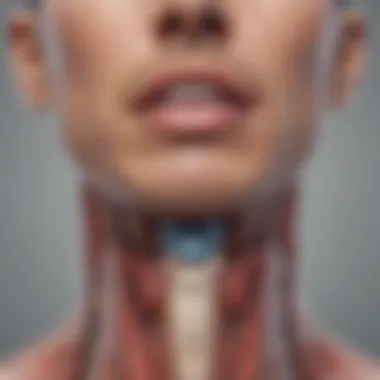Understanding the Link Between Hypothyroidism and Dizziness


Intro
Dizziness clutches a lot of folks in its grip, appearing as a fleeting symptom that can shake up everyday life. The causes of dizziness range widely, from severe conditions like Parkinson’s to something as simple as dehydration. One of the less obvious culprits, however, is the thyroid gland, especially when it’s underperforming, a condition known as hypothyroidism.
This article digs into the relationship between hypothyroidism and dizziness, laying out how this somewhat hidden interlink influences balance and spatial awareness. For those grappling with these issues or for healthcare providers looking to grasp the bigger picture, understanding this connection could be a game-changer.
Research Overview
Summary of key findings
Recent studies have revealed a significant correlation between an underactive thyroid and instances of dizziness. Below are points of interest from the research:
- Thyroid Hormones’ Role: Thyroid hormones help regulate many bodily processes, including metabolism and energy levels. An underactive thyroid can impair these functions, leading to symptoms like fatigue, which often accompanies dizziness.
- Balance and Coordination: Research suggests that low levels of thyroid hormones can impact vestibular function, which plays a critical role in maintaining balance. When thyroid function dips, the communication between the inner ear and the brain can falter, resulting in dizziness.
- Comorbidity: Hypothyroidism often exists alongside other conditions, such as anemia and vitamin deficiencies, which can further complicate the dizziness experienced by individuals.
Importance of the research in its respective field
Understanding the interplay between hypothyroidism and dizziness is vital for creating effective treatment plans. Learning that dizziness may not just be linked to immediate causes but also to underlying thyroid issues allows healthcare providers to look beyond the surface. This exploration helps in formulating a multi-faceted approach to diagnosis and management, potentially improving quality of life for patients who may otherwise be overlooked.
Methodology
Description of experimental or analytical methods used
The research in this field often employs a blend of clinical observations and experimental studies. Key methods include:
- Clinical Trials: Participants with diagnosed hypothyroidism are monitored for their dizziness symptoms before and after treatment with thyroid hormone replacement therapies.
- Surveys and Questionnaires: These tools help gather data on patients’ experiences with dizziness, daily functioning, and overall well-being.
- Diagnostic Imaging: MRI and CT scans can be used to assess any structural abnormalities in the brain that may relate to balance and coordination issues.
Sampling criteria and data collection techniques
Studies generally focus on adults aged 30-60 diagnosed with hypothyroidism. A control group, comprising individuals without thyroid disorders, is also included to offer comparative insights. Data collection involves a combination of personal health surveys, medical history reviews, and objective balance assessments through clinical tests to evaluate the degrees of dizziness experienced.
In summary, recognizing how an underactive thyroid connects with dizziness could illuminate paths for better healthcare interventions and underscore the importance of holistic assessments.
Understanding the Thyroid Gland
The thyroid gland plays a crucial role in maintaining numerous physiological processes in the human body. Tucked away in the front of the neck, this butterfly-shaped gland affects not just metabolism but also impacts the nervous system as well. By understanding how the thyroid operates, we can better grasp how its underactivity, or hypothyroidism, can lead to complications, including dizziness. In a nutshell, the thyroid's proper functioning is essential for energy production, weight management, and overall health, which sets the stage for investigating its connection to common symptoms like dizziness.
Overview of Thyroid Functions
The primary functions of the thyroid are to produce hormones that regulate various bodily functions, from heart rate to metabolism. Thyroid hormones, primarily thyroxine (T4) and triiodothyronine (T3), are instrumental in controlling how the body utilizes energy. Another important function of these hormones involves supporting the development and maintenance of the brain and nervous system. This is particularly relevant when considering symptoms such as dizziness, where a well-functioning thyroid may help maintain equilibrium.
Hormonal Regulation
Regulation of hormones is critical for the thyroid to perform its functions optimally. Its activity is primarily controlled by the pituitary gland, which releases TSH, or thyroid-stimulating hormone, prompting the thyroid to produce T4 and T3. If TSH levels are off-kilter, it can lead to an underactive thyroid, causing a cascade of issues throughout the body, including dizziness.
Thyroid Hormones
Thyroid hormones, specifically T4 and T3, are often considered the backbone of metabolic regulation. These hormones help in the conversion of nutrients into energy, playing a significant role in metabolic processes. Their levels directly affect not just metabolism but also weight and mood stability. An underactive thyroid may lead to low levels of these critical hormones, causing sluggishness and, consequently, impacting balance and causing dizziness.
"An underactive thyroid can leave you feeling like you're trying to drive a car with a flat tire, sluggish and off-balance.”
This metaphor underscores how vital these hormones are to our day-to-day functioning. A unique aspect of thyroid hormones is their ability to affect almost every tissue in the body, which makes their deficiency quite impactful.
Metabolism Regulation
Metabolism regulation through thyroid hormones sets the pace for energy usage in the body. When the thyroid does not produce enough hormones, metabolic processes slow down. This can lead to fatigue and weight gain, two factors that may indirectly affect feelings of dizziness. As the body struggles to maintain energy levels, it can create a sense of unsteadiness, particularly during physical activity or even simple tasks.
The standout feature of metabolism regulation in the thyroid's context is its direct correlation to energy expenditure. An underactive thyroid effectively lowers this expenditure, leading to an array of symptoms that can be debilitating.
Impact on Energy Levels
Energy levels are another area where thyroid function plays a pivotal role. When hypothyroidism occurs, individuals often experience severe fatigue and lethargy. This generalized fatigue may manifest as a lack of stability, both physically and cognitively. Low energy levels can make it challenging to engage in activities where balance is necessary, contributing to that dizzy feeling.
A unique point to consider is how various organs and systems depend on sufficient energy supply to operate. When energy levels falter due to hypothyroidism, it becomes not just an issue of fatigue but also one of compromised bodily functions that may result in dizziness.
In summary, understanding the role of the thyroid gland significantly aids in uncovering how its dysfunction can lead to complications like dizziness. This section has highlighted critical areas such as hormone regulation, metabolism, and energy levels that contribute to the overall picture of how hypothyroidism impacts an individual’s health.
Defining Hypothyroidism
Hypothyroidism, commonly known as an underactive thyroid, is not just a mere clinical term; it's an important subject that affects millions of individuals worldwide. This condition arises when the thyroid gland fails to produce enough thyroid hormones, leading to a cascade of metabolic disruptions. Understanding this condition is crucial, particularly as it relates to various symptoms that can significantly decrease one's quality of life. Given the potential for dizziness to stem from hypothyroidism, it's vital to unravel the intricacies of this underactive state.
Prevalence of Hypothyroidism
Hypothyroidism is a surprisingly common ailment. According to the American Thyroid Association, it affects about 4.6% of the American population aged 12 and older. This prevalence might not seem extensive at first glance, but in raw numbers, we're talking about millions of individuals grappling with its effects. The condition often goes unnoticed because its symptoms can mimic other health issues, leading to underdiagnosis. Studies indicate that women are five to eight times more likely to be affected than men, making awareness and screening among this group critical.
Common Causes of Underactive Thyroid
Understanding the various causes of an underactive thyroid helps paint a clearer picture of how it develops and the factors that can exacerbate its symptoms. Here are some prominent contributors to this condition:
Autoimmune Disease
One of the most significant culprits behind hypothyroidism is an autoimmune disease called Hashimoto's thyroiditis. This is characterized by the immune system incorrectly targeting and damaging the thyroid gland. What makes this condition particularly interesting is its gradual progression; many people may not notice symptoms until well into the disease. Because the body essentially blunders in mistaking its own tissues as foreign, understanding autoimmune disease as a leading cause of hypothyroidism is essential.
Key characteristics include:
- Chronic Inflammation: Over time, the continuous assault on the thyroid leads to a reduced hormone output, triggering a variety of symptoms, including fatigue and weight gain.
- Genetic Factors: Those with a family history of autoimmune diseases tend to be at greater risk.
Iodine Deficiency


Iodine plays a critical role in thyroid hormone production. In regions where iodine is scarce in the diet, hypothyroidism is notably higher. This fact underscores the need for proper nutritional awareness. The body cannot create thyroid hormones without sufficient iodine - it's a bit like expecting a car to run without gas.
One of the unique features of iodine deficiency is that it can be easily remedied with dietary changes or supplementation. However, the drawbacks here lie in awareness and accessibility; not everyone may have access to iodine-rich foods, making education around dietary intake vital for preventing hypothyroidism.
Medications
Certain medications can also lead to hypothyroidism. For example, lithium, commonly used in the treatment of bipolar disorder, can affect thyroid function adversely.
It's crucial to consider that while medications can be beneficial for treating chronic conditions, some of them have unintended consequences on thyroid health. Awareness surrounding prescribed medications and their side effects is key. Patients should be educated on the potential risk factors they’re introducing into their bodies when starting new treatments.
The Phenomenon of Dizziness
Dizziness can be a perplexing symptom, one that often eludes straightforward explanation. In the context of an underactive thyroid, understanding the intricacies behind dizziness is paramount. This symptom doesn't just pop up out of nowhere; it's like the canary in the coal mine, signaling that something deeper may be out of balance. A thorough grasp of dizziness helps in recognizing how hypothyroidism not only affects the thyroid itself but also how it can skew one's perception of stability and balance.
Types of Dizziness
Dizziness does not paint a one-size-fits-all picture; rather, it manifests in various forms, each possessing unique characteristics that can yield insights into underlying health issues. Focusing on these types can shed light on the relationship between underactive thyroid and dizziness.
Lightheadedness
Lightheadedness often feels like a head in the clouds, where the world seems to tilt slightly. It can contribute significantly to the overall topic by indicating shifts in blood pressure or changes to circulation, both of which are related to thyroid function. This sensation, although sometimes mild, can lead to a sudden need to sit down or hold on to something for support.
What sets lightheadedness apart is its ephemeral nature—often passing quickly but leaving an impression that can’t be ignored. It speaks to a transient, yet inconvenient, shift in the body's equilibrium, often requiring quick adjustments that one might take for granted. However, the downside lies in its unpredictability, which can pose challenges in daily life, especially for someone already grappling with other hypothyroid symptoms.
Vertigo
Vertigo can feel like being on a merry-go-round that refuses to stop. It’s a false sense of spinning or movement, significantly affecting quality of life. The connection to an underactive thyroid is particularly compelling, as changes in hormonal levels can disrupt inner ear function, thus fostering sensations of disorientation.
The main characteristic that makes vertigo a noteworthy inclusion is how it often necessitates more than just understanding; it may require interventions like vestibular rehabilitation. The unique aspect of vertigo is its ability to elicit strong reactions, nearly entrapping the individual in its grasp. While it can necessitate medical attention, recognizing vertigo as a symptom may lead to earlier diagnosis of thyroid issues, which is a pivotal advantage in managing health outcomes.
Disequilibrium
Disequilibrium feels like standing on shaky ground. It is more about an imbalance in the body's structural alignment and can often lead to a sense of unsteadiness, especially when walking. In relation to hypothyroidism, this type of dizziness can significantly affect daily activities, making it awkward to navigate through life.
The key characteristic of disequilibrium lies in its manifestation during movement, drawing attention to the body's need for stable neurological and musculoskeletal systems. One unique feature that links it to thyroid dysfunction is how it can evolve into a chronic issue if not addressed. While it might be overlooked as mere clumsiness, raising awareness around disequilibrium can lead to more thorough assessments of thyroid health.
Causes of Dizziness
Understanding the underlying causes of dizziness provides a window into the complex relationship between the body’s systems. Dizziness stemming from various etiologies can have detrimental effects on one's health, which highlights the importance of distinguishing among types.
Neurological Factors
Neurological issues often play a critical role in dizziness, particularly when it comes to the brain's processing of spatial orientation. With an underactive thyroid, there’s a possibility that hormonal deficiencies can impact cognitive functions, thus complicating the body’s balance mechanisms.
The distinctive feature of this interplay lies in the brain's multifaceted reliance on hormonal balance. Herein, researchers find that exploring neurological contributions is not just beneficial—it may be essential for a comprehensive understanding of why dizziness occurs in those suffering from hypothyroidism. However, neurological diagnosis can be intricate and might require specialized imaging or assessments.
Vestibular System Issues
The vestibular system serves as the body’s gyroscope, integral to maintaining balance. Issues here can lead to sensations of dizziness that mimic those associated with an underactive thyroid. When thyroid hormone production falters, so might the vestibular functioning.
The unique aspect of vestibular problems is their direct correlation with spatial awareness. Understanding these issues not only assists in diagnosing thyroid-related dizziness but can also guide therapeutic approaches. Nevertheless, the complexity of vestibular assessments can lead to misdiagnosis or overlooking hypothyroid connections, which should be a consideration for clinicians and patients alike.
Cardiovascular Problems
Dizziness can also spring from cardiovascular concerns, where heart health plays a critical role in maintaining adequate blood flow to the brain. An underactive thyroid can lead to an array of cardiovascular dysfunctions, such as bradycardia or hypotension, both of which may manifest as dizziness.
The hallmark of this connection lies in the body’s circulatory response. When the heart isn’t pumping blood efficiently, or the blood vessels aren't constricting correctly, dizziness can arise. Such insights can be crucial in understanding symptoms better; however, they can make diagnosis challenging, as symptoms can easily be ascribed to other cardiovascular disorders rather than hypothyroidism.
"Dizziness isn't just a symptom; it’s an alarming whisper from the body, urging us to listen and assess the underlying reasons."
Linking Underactive Thyroid to Dizziness
Understanding the connection between an underactive thyroid and dizziness is vital within the scope of this article. Hypothyroidism, or underactive thyroid, can lead to a myriad of symptoms, including dizziness. Recognizing this link offers profound insights into how hormonal balance affects various bodily functions.
The physiological mechanisms that tie these two conditions together can clarify not just the symptoms one experiences but also guide health management strategies. As we focus on specific elements such as blood pressure regulation and neurological impacts, it's essential to note their individual contributions to dizziness, offering a well-rounded perspective on living with hypothyroidism.
Furthermore, unraveling these connections can lead to better awareness and earlier diagnosis. For many individuals, dizziness may seem like a standalone issue, yet it could be a signal of an underlying thyroid imbalance. This realization underscores the necessity for patients and healthcare providers to consider thyroid function when addressing inexplicable dizziness.
Physiological Mechanisms
Impact on Blood Pressure
The impact of hypothyroidism on blood pressure is a notable concern. A poorly functioning thyroid can lead to fluctuations in blood pressure, specifically making it more likely to experience low blood pressure. This can result in lightheadedness or a sense of faintness during physical activities.
The key characteristic here is that low thyroid hormone levels affect the heart's ability to pump effectively, often leading to a slower heart rate and increased resistance in blood vessels. This particular aspect is crucial since it plays a significant role in how blood flows throughout the body.
In this article, acknowledging the impact on blood pressure can be beneficial, especially when considering treatment modalities aimed at stabilizing symptoms of dizziness. A thorough understanding of how blood pressure interacts with thyroid function can aid in developing effective strategies to reduce dizziness.
Advantages of this knowledge include improved monitoring and a better understanding of when a patient might need immediate help. However, there's a disadvantage, too. Not every patient recognizes this connection, which can lead to misdiagnosis and untreated symptoms.
Circulatory System Adjustments
Circulatory system adjustments are another critical aspect of how an underactive thyroid relates to dizziness. An underactive thyroid can cause decreased circulation efficiency due to its influence on heart rate and vascular resistance. Since the thyroid hormones ideally promote good circulation, their deficiency can compromise the body's ability to transport oxygen and nutrients effectively.
The key characteristic here lies in how thyroid dysfunction correlates with broader circulatory health. While we often think about thyroid health concerning metabolic rates, it also deeply affects our blood flow. This aspect is substantial for our article as it addresses how such adjustments could lead to spells of dizziness.
Unique features in this context include the way decreased circulation complicates existing dizziness symptoms. Patients frequently report feeling more fatigued alongside dizziness, likely due to the circulatory effects. Hence, understanding this connection allows healthcare professionals to better design interventions, although some patients might find it challenging to connect these symptoms without clear guidance.
Neurological Effects


Neurological effects arising from hypothyroidism significantly link to dizziness. The brain is highly sensitive to hormonal fluctuations, and a deficiency in thyroid hormones can affect cognitive function and balance. Such disturbances can contribute to sensations of dizziness by impairing coordination while walking or standing.
The key characteristic of neurological impacts here is the connectedness of the thyroid to the central nervous system. When hormone levels are insufficient, the brain might struggle to effectively process sensory information, leading to compromised balance. This aspect makes it a pertinent choice for our discussion on how an underactive thyroid can provoke dizziness.
An important advantage of recognizing these neurological effects is the possibility for targeted therapeutic approaches. By addressing brain health along with thyroid function, professionals can offer a more comprehensive treatment plan. However, the disadvantage is a potential oversight, where dizziness is incorrectly attributed solely to other neurological issues, neglecting a thyroid examination altogether.
Symptoms of Hypothyroidism
Fatigue
Fatigue is perhaps one of the most universally reported symptoms of hypothyroidism. Individuals often describe it not just as tiredness but a profound lack of energy that doesn't lift with rest. This drained sensation can be detrimental, compounding the experience of dizziness, making daily life feel like an uphill battle.
The key characteristic of fatigue stems from a slow metabolism and suboptimal energy production within the body. It becomes crucial to discuss this symptom regarding dizziness because the two often coexist, leading to a poorer quality of life. As a result, understanding its role becomes a vital facet of any article discussing underactive thyroid effects.
It's critical to highlight that fatigue associated with hypothyroidism often portrays a unique quality, persisting despite adequate sleep or rest. As such, patients may find themselves feeling worse during periods of activity, which can lead to dizziness during efforts to maintain balance and stability, feeding into the overall impact of dizziness in these individuals.
Weight Gain
Weight gain is another common symptom that individuals with hypothyroidism face, and it can inadvertently contribute to feelings of dizziness. As metabolic rates decrease due to an underactive thyroid, weight gain often ensues, leading to additional strain on the body's systems.
The key characteristic here is the link between increased body mass and how it affects overall energy expenditure. Individuals might notice they feel heavier and less stable, which might trigger symptoms like dizziness, particularly when trying to engage in physical activity. Understanding weight gain's role in dizziness underscores the idea that managing thyroid levels can impact weight, and vice versa, complicating the existing issues.
Additionally, this weight gain is often perceived as frustrating by those affected, as it can create a cyclical challenge between trying to be active and dealing with the resultant dizziness. Patients may find it hard to pinpoint where their symptoms originate from, emphasizing the need for a comprehensive approach.
Cognitive Disturbances
Cognitive disturbances add another layer to the complex tapestry of hypothyroidism-related symptoms. Individuals may encounter memory lapses, difficulties in concentration, and a general sense of mental fog, all of which can aggravate instances of dizziness. The brain's ability to properly process information diminishes, impacting overall cognitive health.
Here, the key characteristic lies in how these disturbances make daily decision-making feel effortful. For those struggling with cognitive issues, it can lead to instances of confusion in busy environments, which can, in turn, elicit dizziness when navigating or multitasking.
Discussing cognitive disturbances is significant as it encapsulates how the body does not merely experience symptoms in isolation. Instead, all symptoms interact, creating a web of challenges — for instance, sudden dizziness may feel heightened when cognitive clarity is compromised. This emphasizes the importance of recognizing that cognitive symptoms must be acknowledged alongside physical ones, as they contribute to diminishing the quality of life.
Understanding these symptoms collectively paints a clear picture of how hypothyroidism can disrupt not just physical balance but also mental equilibrium, further connecting the dots to dizziness.
Diagnostic Approaches
Understanding the diagnostic approaches for hypothyroidism is vital in demystifying the connections between an underactive thyroid and symptoms like dizziness. These methods not only lay the groundwork for accurate diagnosis but also pave the way for effective treatment. The importance of early identification cannot be overstated, especially considering the fluctuating nature of thyroid hormone levels and the subjective experience of dizziness. Each diagnostic element offers unique insights and advantages, ensuring a well-rounded evaluation process that can lead to better health outcomes.
Initial Assessment
Patient History
An in-depth patient history provides crucial context for diagnosing thyroid issues, particularly in individuals presenting with dizziness. It encapsulates aspects like previous medical conditions, medication use, family health patterns, and lifestyle choices. The egalitarian nature of discussing one's history fosters a deeper understanding between the patient and healthcare provider.
A standout characteristic of patient history is its ability to capture the unique journey of an individual's health. For instance, detailed accounts of symptoms can highlight experiences that may have gone unnoticed by the patient themselves. A robust patient history is beneficial because it often unveils a narrative that clarifies the general picture. However, relying solely on narratives without corroborating tests can be tricky, as subjective descriptions can vary significantly in accuracy.
Symptom Evaluation
Symptom evaluation takes patient history a step further by zeroing in on specific manifestations of conditions. In the context of dizziness linked to an underactive thyroid, identifying how symptoms present—be it through balance issues or feelings of unsteadiness—is essential.
Its primary characteristic is the systematic approach to cataloging symptoms based on frequency and severity. This objective assessment serves as a popular choice for healthcare professionals because it provides measurable data that can be correlated with laboratory findings. A unique benefit of this method is its ability to compile an evidence-based list of symptoms, helping in prioritizing clinical focus. However, while symptom evaluation adds precision, it may overlook underlying emotional factors that could contribute to or exacerbate a patient's experience of dizziness.
Physical Examination
The physical examination rounds out the initial assessment, allowing health professionals to gather observable data that can further clarify diagnosis. This hands-on approach focuses on assessing balance, coordination, and other relevant physical attributes.
Its key feature is the simultaneous observation of both physical and neurological functionality, making it an indispensable tool in medical assessments. The real-world advantage lies in the direct ability to visualize symptoms and their manifestations. Yet, the downside is the potential for findings to be influenced by momentary factors—like anxiety—that might not reflect a chronic condition.
Diagnostic Tests
As vital as initial assessments are, nothing beats the enlightenment brought on by diagnostic tests in connecting hypothyroidism with dizziness. These tests offer quantifiable results that lead to informed decisions regarding treatment and management. Understanding these results can elucidate the deeper relationship between thyroid function and various symptoms, including dizziness.
TSH Levels
Testing Thyroid-Stimulating Hormone (TSH) levels is often the first step in assessing thyroid function. TSH acts as a messenger, signaling the thyroid to produce hormones, and its elevated levels typically indicate an underactive thyroid.
This test is favored due to its simplicity and ability to indicate thyroid dysfunction quickly. A notable feature is its widespread use; TSH tests are common and readily available in clinical settings. Accessibility makes it a beneficial tool in the early phases of diagnosis. One disadvantage is that TSH levels alone might not provide a complete picture of thyroid responsiveness, often necessitating further tests chronic conditions.
Free T4 Measurement
The free T4 measurement assesses the amount of thyroxine hormone available in the bloodstream and is crucial for understanding metabolic activity. This test often confirms the diagnosis initiated by abnormal TSH levels and helps gauge thyroid dysfunction severity.
Its key characteristic is the emphasis on the bioactive form of the hormone, which is directly influential in energy metabolism and balance. This tailored focus makes it a valuable choice in the context of dizziness. However, it may not always correlate perfectly with clinical symptoms, requiring careful interpretation alongside other test results.
Antibody Testing
Antibody testing, particularly for thyroid peroxidase antibodies, can determine if autoimmune processes, like Hashimoto's thyroiditis, are contributing factors. This kind of testing reveals essential details about the underlying causes of the hypothyroid condition.
A distinct advantage is its ability to identify specific autoimmune responses, which can inform preventive measures and treatment strategies. The downside is that these tests can sometimes yield false positives, leading to potential confusion or unnecessary worry for patients. Overall, combining these various diagnostic methods enables a comprehensive approach to understanding the interplay between an underactive thyroid and the troubling symptom of dizziness.
Management of Hypothyroidism
Managing hypothyroidism is crucial not just for bolstering thyroid health but also for alleviating symptoms like dizziness. It’s essential for individuals to grasp that an underactive thyroid can lead to a range of complications, and effective management can substantially improve the quality of life. Understanding the options available for managing hypothyroidism furnishes patients and healthcare providers with the knowledge to tackle the condition proactively.
The significance lies not only in treating the thyroid dysfunction but also in enhancing overall well-being. When thyroid levels stabilize, the effects can ripple out, impacting energy levels, mood, and cognitive function. As we dive into various management strategies, it's worth noting that a comprehensive approach typically yields the best results.
Treatment Options


Thyroid Hormone Replacement Therapy
Administering thyroid hormone replacement therapy is a standard approach in managing hypothyroidism. This involves taking synthetic thyroid hormones, like levothyroxine, to restore normal hormone levels. The key characteristic here is that the therapy mimics the hormones that the thyroid should naturally produce but fails to in individuals with an underactive gland.
This method is popular because it directly addresses the hormonal deficiencies linked with hypothyroidism. Remarkably, labs often confirm a notable shift in TSH and T4 levels when therapy is effectively tailored. However, while it is effective, the therapy comes with the caveat of needing regular monitoring.
One unique feature of this approach is the individual's response to dosage. Each patient's ideal thyroid hormone dose can differ. Some may find themselves needing adjustments over time, which can be an advantage or disadvantage depending on how responsive the patient’s body is.
Lifestyle Adjustments
Incorporating lifestyle changes complements medical treatment for hypothyroidism. Key adjustments include incorporating regular exercise, achieving a balanced diet, and maintaining a healthy sleep schedule. The notable aspect of lifestyle adjustments is their ability to enhance overall physical health, which is crucial since fatigue and sluggishness often accompany hypothyroidism.
This holistic method is beneficial, as it promotes long-term health rather than merely addressing thyroid levels. One unique feature of lifestyle changes is their dual benefit; not only do they support thyroid function, but they also help mitigate other symptoms like dizziness and fatigue.
However, changing habits isn’t always straightforward, and adherence can vary from person to person, which might hinder results.
Nutritional Considerations
Diet plays a pivotal role in managing hypothyroidism effectively. Ensuring adequate intake of key nutrients like iodine, selenium, and zinc can significantly support thyroid function. The primary character of this approach is that nutrition not only aids in hormone production but may also enhance overall health.
Adding nutrient-rich foods can empower individuals in managing their condition naturally, making it a favorable option alongside traditional therapies. A unique feature here is that dietary adjustments can be tailored to individual preferences and needs, allowing for flexibility in treatment.
However, one should remain cautious as excessive supplementation, particularly iodine, can sometimes cause more harm than good. Keeping a balanced approach is key.
Addressing Related Dizziness
Vestibular Rehabilitation
Vestibular rehabilitation is a specialized therapeutic approach aimed at managing dizziness and balance disorders, often linked with thyroid dysfunction. This treatment emphasizes exercises designed to improve the brain's ability to process and adapt to sensory information about balance. The distinctive aspect here is the tailored nature of the therapy to address individual deficits in balance and spatial orientation.
Thus, for patients experiencing dizziness due to their thyroid condition, this therapy can be a beneficial line of treatment. However, it does require commitment and frequent practice to see significant results. Some might find it tedious, which can be a barrier to compliance.
Medication Adjustments
For individuals whose dizziness could be exacerbated by other medications, adjusting or changing current prescriptions may also be crucial. The key characteristic of medication adjustments is their ability to pinpoint which drugs could be causing or intensifying dizziness, thus providing an opportunity for modified treatment plans.
This choice is often beneficial when other health conditions coexist, requiring a careful review of all medications. On the downside, it can create a trial-and-error phase where alternatives might not yield an immediate solution, making it somewhat of a waiting game for patients.
Ongoing Monitoring
Regular check-ins with healthcare providers significantly impact the management of hypothyroidism. Ongoing monitoring involves tracking thyroid hormone levels and evaluating symptoms systematically. This process’s key characteristic is ensuring that individuals are receiving the appropriate level of care regularly. It’s here that treatment plans can be reassessed, and adjustments made as necessary.
A unique feature of ongoing monitoring is the establishment of a strong patient-provider relationship, fostering an environment where concerns can be addressed timely. On the flip side, it requires consistent effort from both parties, and access to health services can sometimes pose a challenge.
In sum, managing hypothyroidism effectively is a blend of medical intervention, lifestyle changes, and monitoring, helping individuals alleviate symptoms like dizziness and improving overall health.
Future Directions in Research
Understanding the intricate connection between an underactive thyroid and feelings of dizziness opens new avenues for scientific inquiry and therapeutic strategies. Research in this area can elucidate the underlying mechanisms that link thyroid function to vestibular health. This is particularly important, as the symptoms of dizziness can significantly impair quality of life, affecting daily activities and overall well-being. It is crucial for healthcare professionals and researchers to identify the connections in a manner that informs both diagnostic practices and treatment regimens.
Exploring New Therapies
As research advances, one area that stands to benefit immensely is the development of novel therapeutic interventions. New therapies might include tailored medication regimens that specifically address the symptoms of dizziness associated with hypothyroidism. For instance, while thyroid hormone replacement remains the cornerstone of hypothyroidism management, adjunctive treatments—like those targeting vestibular rehabilitation—could prove beneficial for patients experiencing persistent dizziness.
Potential directions for therapy assessment may include:
- Combination therapies: Evaluating the impact of integrating thyroid replacement with vestibular rehabilitation.
- Personalized medicine: Understanding individual responses to treatment can better inform therapy choices.
- Emerging drugs: Research into newer pharmacological options tailored to manage thyroid-related dizziness could offer hope.
By investigating a range of therapies, researchers can enrich the therapeutic arsenal available for managing conditions linked to underactive thyroid dysfunction. This proactive approach might not only improve treatment outcomes but also enhance patient experiences during their healthcare journey.
Understanding Long-Term Effects
Equally crucial is the exploration of the long-term effects of untreated or inadequately managed hypothyroidism. Studies examining how prolonged underactivity influences overall health, especially pertaining to sensory and cognitive functions, can shed light on the chronic implications of thyroid dysfunction. For instance, persistent dizziness might not just be an isolated symptom but could indicate wider neurological or systemic concerns over time.
Engaging in longitudinal studies can provide insight into several facets, such as:
- Cognitive decline: Does prolonged underactivity correlate with neurodegenerative conditions?
- Balance issues: What are the lasting impacts on motor functions and general mobility?
- Comorbid conditions: How does hypothyroidism interplay with the incidence of other health issues like anxiety or depression?
Understanding these long-term effects is vital, particularly for striking a balance in treatment decisions and fostering a broader awareness within the medical community. Each of these inquiries into the long-term consequences of underactive thyroid engagement can inform screening, prevention, and patient education strategies.
End and Implications
Understanding the connection between an underactive thyroid and dizziness is crucial for multiple reasons. For individuals experiencing this dual challenge, accurate diagnosis and treatment can significantly improve their quality of life. In this discussion, it becomes evident that hypothyroidism is not just a benign condition but one that carries with it a host of symptoms that can disrupt daily functioning.
The implications of recognizing this connection extend far beyond mere theory. When healthcare professionals are aware of the potential for dizziness as a symptom of thyroid dysfunction, it paves the way for thorough assessments. This understanding encourages practitioners to look beyond the surface, ensuring that patients do not suffer unnecessarily from unlinked dizziness when perhaps a thyroid-related concern lies at the heart of the issue.
Additionally, this intertwining of symptoms calls for an enhanced focus on multimodal treatment strategies. Just addressing thyroid hormone levels may not suffice— integrating approaches that also target balance and dizziness through physical rehabilitation, lifestyle changes, and closely monitored medication can lead to better outcomes.
"It is vital for healthcare providers to maintain an informed perspective on how intertwined body systems influence one another."
Summarizing the Findings
After a thorough exploration, it is apparent that hypothyroidism significantly influences the sensation of dizziness. The findings underscore several critical points:
- The role of thyroid hormones in regulating metabolic and neurological systems reveals a direct link to feelings of imbalance.
- Symptoms like fatigue, weight gain, and cognitive disturbances can exacerbate feelings of dizziness, creating a cycle that is often difficult for patients to navigate.
- Diagnostic measures such as TSH levels and free T4 measurement are essential in confirming thyroid-related issues, thereby providing a clearer pathway towards effective treatment for dizziness.
In essence, the intersection of thyroid health and dizziness lends itself to a more comprehensive understanding of symptomatology in clinical settings. This highlights the need for both patients and healthcare practitioners to remain vigilant about exploring all possible interconnections.
Importance of Awareness and Diagnosis
Heightened awareness regarding the link between thyroid dysfunction and dizziness is paramount. Hypothyroidism can present itself through various subtle symptoms, which can lead to misdiagnosis if a comprehensive patient history and symptom evaluation are not performed. Recognizing thyroid issues early can lead to prompt treatment and the prevention of further complications.
Moreover, the engagement between patients and healthcare providers must be strengthened to facilitate better communication about symptoms. Patients should feel empowered to discuss any feelings of dizziness, fatigue, or other unusual experiences openly with their doctors. In doing so, they can advocate for appropriate tests that might reveal an underlying thyroid condition.
Advancing awareness also encourages further research into comprehensive treatment options that address both thyroid management and symptomatic relief from dizziness. This forward-thinking approach could significantly shape better patient outcomes and enhance quality of life. Ultimately, continued focus on educating the public and professionals about these potential connections can drive change in how thyroid health is perceived within the broader scope of health care.







